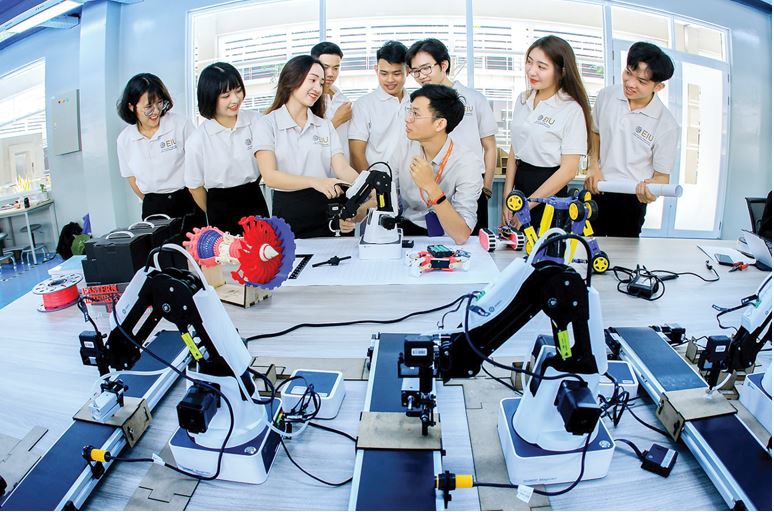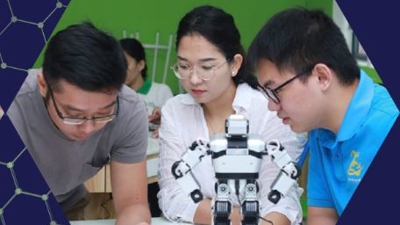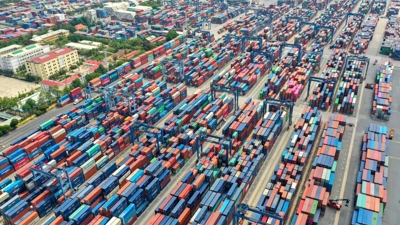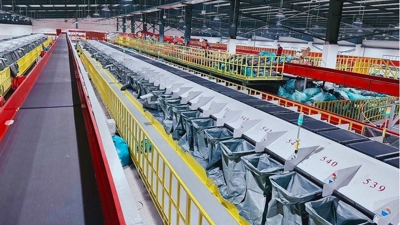The pivotal role of intellectuals in the era of Industry 4.0
The intelligentsia will be a key factor in Vietnam’s bid to forge ahead with science and technology, innovation, and digital transformation via Politburo Resolution No. 57.

In the era of Industry 4.0, Vietnam’s intelligentsia play a pivotal role in driving innovation, advancing science and technology, and leading the country’s digital transformation. Experts have highlighted that Politburo Resolution No. 57-NQ/TW on the breakthrough development of science, technology, innovation, and national digital transformation presents bold measures and solutions that inspire great optimism within the science and technology community.
At a seminar in Hanoi on April 29 on the role of science and technology intelligentsia in implementing Politburo Resolution No. 57, organized by the Vietnam Union of Science and Technology Associations (VUSTA), Dr. Pham Van Tan, former Vice President of VUSTA, emphasized that the Resolution has been well-received by both the scientific community and the public and that its implementation is expected to significantly reshape the country’s economic and social landscape.
Strengthening the role
Science and technology intelligentsia account for nearly 90 per cent of Vietnam’s intellectual cohort. Various solutions have been introduced in the country to enhance the role of various intellectual associations.
Experts argue that, in the context of implementing Politburo Resolution No. 57, strengthening the role of science and technology intellectuals must go hand-in-hand with reforming the operational mechanisms of intellectual associations. These associations should be seen not only as professional social organizations but also as advisory and policy analysis channels for the Party and State, particularly in new technologies, the digital economy, and the development of smart cities.
Among the tasks and solutions mentioned in the implementation of the Resolution are several areas where VUSTA can take the lead or collaborate with other agencies. These include raising awareness and making breakthroughs in thinking, fostering the development and utilization of high-quality human resources, and boosting scientific, technological, innovation, and digital transformation activities in businesses.
To strengthen its role in the new context, VUSTA must actively propose solutions in coordination with the Vietnam Fatherland Front and other political and social organizations entrusted by the Party and State.
In terms of enhancing the role of science and technology intellectuals in implementing Politburo Resolution No. 57 and contributing to national development, Dr. Le Xuan Rao, President of the Hanoi Union of Science and Technology Associations, emphasized the importance of raising awareness and responsibility among the intelligentsia to create unity in understanding. Alongside this, policies and mechanisms should be improved to develop and utilize the intelligentsia, ensuring a legal framework that encourages intellectual contributions and creativity. This includes leading or coordinating the development of legal documents related to intellectuals, such as the Law on Science and Technology and Innovation, and policies to attract experts.
Creating a favorable working environment for intellectuals to innovate is key. This can be done by developing specialized intellectual clubs, promoting scientific and technological activities, innovation, and digital transformation within businesses, and connecting businesses with scientists through technology trade promotions and technology exchanges.
Dr. Rao also suggested piloting a research support fund and promoting the commercialization of science and technology products. To effectively advise on technology transfer and offer policy analysis, scientific research tasks are critical. VUSTA recently supported and allocated funding to a number of local unions to carry out advisory and analysis tasks.
He also stressed the need to place greater emphasis on gathering and connecting young intelligentsia, overseas Vietnamese intelligentsia, and experts working in international organizations. These high-level professionals can quickly access new technologies and play an essential role in helping Vietnam integrate deeper into the global value chain in science, technology, and innovation.
Increasing productivity
Based on the contents outlined in Politburo Resolution No. 57 and the new context for VUSTA, Dr. Tan suggested that, in addition to specifying the tasks entrusted to the Union by the Party and State regarding the implementation of the Resolution, there is an urgent need to study and adjust VUSTA’s operational model to better align it with the new context.
It should also expand its self-managed organizational model and autonomous mechanism, with the market, society, and businesses as the core partners. This approach aims to fully harness and exploit the potential and creative strength of scientific and technological intellectuals to serve the needs of society and businesses, accelerating the application of science and technology in business development.
According to Dr. Tan, VUSTA boasts a large pool of high-quality human resources, with many leading experts and scientists, along with an experienced and influential management team. It is therefore necessary to urgently research and establish independent advisory organizations, or think tanks, under VUSTA’s direct management. These centers or councils with legal status could provide policy, economic, and scientific-technical consulting on various fields where VUSTA’s intellectuals have potential, helping governmental agencies and businesses based on supply-demand principles and adhering to market mechanisms for mutual benefit.
He cited examples of successful experience gained by VUSTA and its member associations, such as the Vietnam Seed Trade Association’s consultancy saving billions of VND from hybrid rice seed development, or the Vietnam Thermal Science and Technology Association’s advice on several thermal power projects, saving hundreds of millions of USD through the selection of power plant equipment.
Experts believe that Politburo Resolution No. 57 reaffirms the importance of science, technology, and innovation in the country’s development towards a new era of growth.
According to Mr. Dang Huy Dong, President and Founder of the Planning and Development Institute, to achieve Vietnam’s target of 8 per cent growth in 2025 and double-digit growth in subsequent years with relatively limited resources, increasing workplace productivity is a must. “The greatest reward for the intelligentsia is when the products of scientific research, technology, and innovation are put to use,” he said. “To achieve this, we need to create markets for scientific and technological products. The number of science and technology products applied in daily life and participating in the market is the true measure of success in implementing the Resolution.”
He added that there will be many millionaires and billionaires that will rise from science, technology, and innovation, which will inspire a movement of learning and research and a legitimate desire to create wealth. “The final and most accurate measure is the increasing number of intellectuals, scientists, and innovators who become millionaires and billionaires,” he emphasized. “This will be the turning point for the country’s prosperity.”
Forces for development
Dr. Pham Ngoc Son, Vice President of the Vietnam Association of Geological and Mineral Enterprises, believes that the key issue is to fully institutionalize these solutions in legal documents for implementation. He said most scientists in VUSTA member associations are retirees. While they possess strengths such as experience, specialized knowledge, and rich practical insights, as well as independence and creative thinking, they also face challenges when participating in the implementation of Politburo Resolution No. 57.
These challenges include difficulties in remaining updated on new knowledge, trends, and technologies; a lack of mechanisms to actively participate in consulting and counteracting as well as leading or participating in the implementation of scientific research tasks under the guidance of ministries, sectors, localities, and other relevant State agencies; and the low remuneration and incentives for consultancy, counteracting, teaching, and knowledge dissemination activities, which are not proportional to their capabilities and the quality of work performed.
To ensure active and effective participation by VUSTA, its member associations, and scientists in the implementation of Politburo Resolution No. 57, Dr. Son suggested that the framework of legal documents be amended and supplemented to fully institutionalize the perspectives, tasks, and solutions outlined. “There must be mechanisms to ensure the proactive and effective participation of VUSTA, its member associations, and scientists in leading or participating in research projects, topics, and scientific tasks under the guidance of ministries, sectors, localities, and other relevant state agencies,” he proposed.
Dr. Nghiem Vu Khai, former Vice President of VUSTA, affirmed that Politburo Resolution No. 57, with its breakthrough measures and solutions, has sparked great hope among scientific and technological intellectuals. Immediately after the Politburo issued the Resolution, the government implemented an action plan and the National Assembly issued Resolution No. 193/2025/QH15, piloting special mechanisms and policies to create breakthroughs in the development of science, technology, innovation, and national digital transformation.
In the context of Industry 4.0, Vietnam’s intellectual workforce plays a key role in promoting innovation, the development of science and technology, and national digital transformation. To harness the full potential of this role, there is a need to implement coherent policies, invest in education and training, attract and retain talent, and support research and innovation. In the era of digitalization and AI, intellectuals are the pioneers in creating new knowledge, shaping policies, and leading social transformation.
According to Dr. Khai, unlocking the role of intellectuals not only requires investment in resources but also demands a profound shift in policy thinking, from mere support to collaboration, from guidance to liberation, and from management to creating enabling conditions. The government must view intellectuals as strategic partners in the sustainable development, innovation, and future-building of the country.
Dr. Phan Xuan Dung, President and Secretary of the Party Committee of VUSTA, said that to direct the thorough implementation of Politburo Resolution No. 57, the Party Committee of VUSTA has issued Plan No. 16-KH/DULHHVN, which emphasizes the responsibility, intelligence, and enthusiasm of scientists and intellectuals within VUSTA to enhance research and transfer scientific and technological advancements into practical production, increasing the scientific content and making science, technology, and digital transformation key forces in the country’s socio-economic development.
VUSTA has also developed an implementation plan for the Resolution, mobilizing national industry associations, local unions, and scientific and technological organizations to contribute to the development of science, technology, innovation, and national digital transformation.







